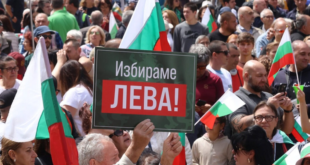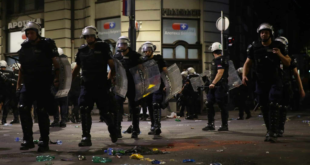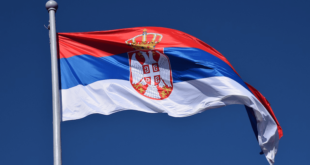Two years after the European Union’s last enlargement brought Bulgaria and Romania into the European bloc in 2007, the EU’s appeal in the immediate neighbourhood seems to be on the wane.
Applicant and potential applicant countries, always the most enthusiastic supporters of EU integration, are becoming less so as domestic problems, the global financial crisis and the EU’s own ‘enlargement fatigue’ force them to look beyond Brussels for solutions to their specific needs.
The states of the Western Balkans are in many respects different from those of Central and Eastern Europe, states which comprised the majority of the new entrants in the last wave of EU enlargement.
The most notable difference is that many of the former went through violent domestic conflicts in the last two decades since the fall of communism, as several new states were established after the dissolution of Socialist Yugoslavia.
The common wisdom has been that integration into the EU and NATO would contribute to solving the region’s problems, and help overcome conflict legacies through increased regional cooperation, strengthening of democracy and respect for human and minority rights.
Yet, it appears that the road to EU integration in the Western Balkans may prove bumpier than expected and countries may take a few detours before reaching their intended destination, as the case of Macedonia illustrates.
Four years after the armed conflict in 2001, Macedonia was awarded EU candidate state status in late 2005. Around this time and before the 2006 general elections, pro-European sentiments dominated the domestic discourse of both politicians and the wider public, with an overwhelming 90% of citizens then supportive EU membership. The platform of every political party was based on support for EU and NATO integration, and those were among the highest priorities on the agenda of the government at the time.
Today, almost three years later and on the eve of presidential and local elections in Macedonia, the picture looks rather different. While still a candidate state, Macedonia has not progressed much further with EU integration. Three consecutive Annual Progress Reports of the European Commission have not recommended opening accession negotiations. Further, the government failed to deliver on an additional 8-point benchmark list prepared by the European Commission as a roadmap for getting a date for starting accession negotiations.
Worse still, the early general elections held in 2008 witnessed electoral violence, culminating with the shooting death of one individual. This violence, along with widespread voting fraud, amounted to the least democratic elections the country has held since independence, further tarnishing its image in Brussels.
Moreover, while each Commission report and the election observation report sees pledges to renewed commitment towards EU integration, it seems that the country is slowly becoming more skeptical about the undisputed priority of EU integration on its foreign policy agenda.
As a result, the election campaigns in 2009 also look very different than those in 2006. Talk of ‘EU integration’ has been replaced, and ‘national unity’ has taken over as the buzzword and banner slogan of these elections.
Gjorgje Ivanov, the presidential candidate of the ruling right-of-centre VMRO-DMPNE party, and the candidate with highest popular support in all opinion polls conducted during the last several weeks, is running his campaign with the slogan ‘One for All,’ emphasizing the need for national unity and overcoming ethnic and partisan divisions to unite the country’s population of 2 million during difficult economic and political times.
Ljube Boskovski, a former interior minister indicted and later acquitted by The Hague Tribunal for war crimes during the 2001 conflict, is another presidential candidate using the ‘unity’ motto in his campaign. This nationalist candidate calls for uniting a society deeply divided on ethnic, religious and partisan lines, drawing heavily on a reconciliation vocabulary emphasizing forgiveness, forgetting and building ‘new patriotism’ oriented into the future rather than the past (though he has in the past had little appeal to minority blocs, particularly Albanians).
The main opposition candidate, Ljubomir Frckovski, is holding a more pro-European stance in his campaign, reflecting the Social Democratic Union’s stated commitment to EU integration. However, his is a highly reactive campaign, engaging in discussion and criticisms of the main principles of the ruling party’s political doctrine, thus contributing to an election discussion centered on issues of national unity, patriotism and national identity.
Perhaps the main reason for the inward-oriented political discourse is the unresolved name dispute with neighboring Greece, which started immediately after independence and culminated dramatically with the last NATO summit in Bucharest in April 2008, when Macedonia was not invited to join NATO along with Croatia and Albania due to Greek objections.
The failure at Bucharest came as a blow to the confidence of the Macedonian leadership from which they are still recovering. After Bucharest, the UN-led negotiations with Greece stalled and Macedonian politics became increasingly introspective and concerned with issues of national history and identity, while regional and European integration were pushed in the background.
The rising disillusionment with EU integration displayed by major political actors on the Macedonian political arena is very different from the pre-accession Euro-skepticism of Central East European states, where marginal and sector-focused politicians were the only Euro-skeptics. In the case of Macedonia, membership in the European Union is often portrayed as clashing with national interests (i.e., changing the name of the country to accommodate Greek demands), not merely as only an expensive proposition or something encroaching on the interests of, for one example, farmers or other parts of the population.
As seen in the current election campaign, Albanian politicians and the ethnic Albanian part of the population are now becoming the strongest supporters of Macedonia’s integration into the EU and NATO, as they tend to perceive the name-dispute with Greece in less emotional terms and are more willing to compromise.
This dichotomy could lead to yet another dividing line between the two largest ethnic groups in Macedonia, but it could also put a fresh impetus onto the EU integration project.
The political system in Macedonia is such that it allows for bargaining across ethnic and party lines, both in government coalition-building and for electing a president. If politicians use the mechanisms at their disposal wisely, Macedonia can emerge from the forthcoming elections with a fresh, albeit more sober, consensus on EU and NATO integration.
 Eurasia Press & News
Eurasia Press & News



